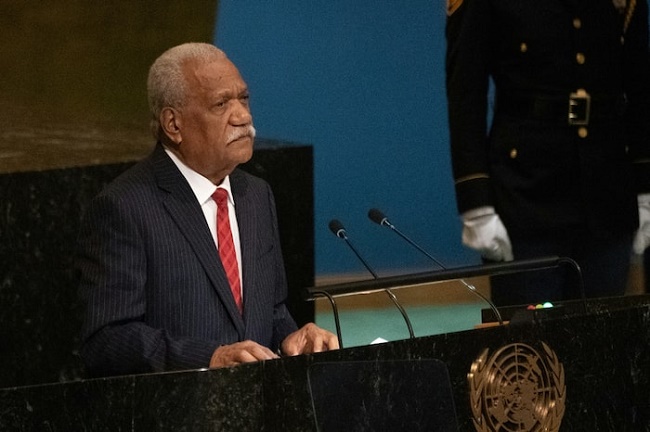With a new, revised schedule announced this week, the stage is set for the International Court of Justice (ICJ) proceedings on the obligations of States under international law in respect of climate change. The first day of testimony will now feature a delegation from Vanuatu, the Pacific Island State that initiated the request for the advisory opinion from the ICJ.

The climate change advisory opinion is the largest case ever before the ICJ, with record numbers of written statements and comments already submitted and 110 States and Intergovernmental Organisations scheduled to make oral presentations next month. At a briefing several days before the start of COP29, the UN’s annual climate change talks, Vanuatu’s government called on nations around the world to finally and decisively act on climate change.
With COP29 set to begin November 11 in Azerbaijan, many delegations from Small Island Developing States attending the meeting are looking to the ICJ and its advisory opinion to compel more significant global efforts to lower emissions and address the already growing impacts of climate change.
According to the October 2024 report from the United Nations Environment Programme, global greenhouse gas emissions continued to increase in 2023. The G20 countries (excluding the African Union) were responsible for 77% of all emissions; in comparison, the 47 least developed countries combined were responsible for just 3%.
The ICJ case, led at the State-level by Vanuatu, seeks to clarify the legal obligations of States to combat climate change and protect vulnerable communities. Vanuatu contributes only 0.02% of global greenhouse gas emissions yet suffers disproportionately from climate impacts. For decades, Pacific Island States have experienced devastating impacts of climate change, including increasingly severe cyclones, rising sea levels and land degradation. These disasters have displaced communities, threatened livelihoods and eroded local economies.
The ICJ is scheduled to hear oral statements and impact testimonies on the case starting on December 2; 94 oral statements will be given by States, including a joint statement by the Nordic States, and 12 will be given from intergovernmental organisations including the European Union and the Organisation of the Petroleum Exporting Countries (OPEC). The ICJ also received 91 written submissions and over 60 additional written comments, making the advisory proceedings the largest case in the history of the ICJ.
Ralph Regenvanu, Special Envoy for Climate Change and Environment for the Republic of Vanuatu, said: “Vanuatu and other small island states are among the most affected by climate change, even though they contribute only a fraction to global emissions. The lack of progress at UN climate change talks in lowering emissions and slowing down climate change – despite the Paris Agreement – necessitates legal action.”
Margaretha Wewerinke-Singh, Attorney at Blue Ocean Law and legal counsel for Vanuatu in the ICJ case, said: “This case addresses the ongoing violation of fundamental legal norms, including human rights, through the destruction of Earth’s climate system. The damage being inflicted represents an unlawful assault on the very foundations of life itself.
“Communities are already suffering devastating losses and damages from disappearing territories and livelihoods to forced displacement and death. The continuing degradation of our climate system infringes upon established rights to life, health, culture, and self-determination – with the world’s most vulnerable peoples suffering the gravest violations.”
Cristelle Pratt, Assistant Secretary General, Environment & Climate Action, Organisation of African Caribbean and Pacific States (OACPS), said: “The remarkable coalition supporting this case extends far beyond small island developing states. We have seen strong backing from nations across Latin America, Africa, Europe, and Asia. This isn’t simply about island nations – it is about all countries (and their communities and citizens) recognising that the destruction from climate change violates fundamental principles of international law. We all hope that the ICJ advisory opinion on the obligations of States with respect to Climate Change will compel everyone on our Blue Planet to reduce their greenhouse gas emissions.”
Vishal Prasad, Campaign Director for the Pacific Islands Students Fighting Climate Change (PISFCC), said: “For our generation and for the Pacific Islands, the climate crisis is an existential threat. It is a matter of survival, and the world’s biggest economies are not taking this crisis seriously. We need the ICJ to protect the rights of people at the frontlines, those now and those who will come after us. This is a historic opportunity to shape the development of international law to work for us.”
